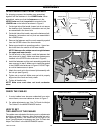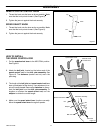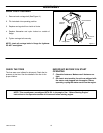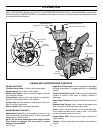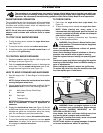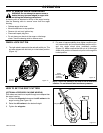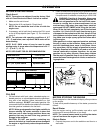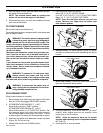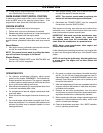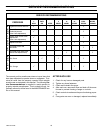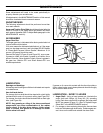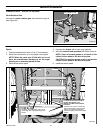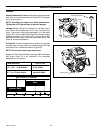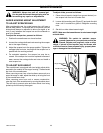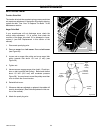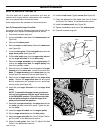
OPERATION
18
MTF-0410102L
10. To stop engine, move throttle control lever to STOP posi-
tion. Remove key. Do not turn key.
WARM ENGINE START (RECOIL STARTER)
If restarting a warm engine after a short shutdown, leave
choke at “OFF” and do not push the primer button. If the
engine fails to start, follow the Cold Start instructions.
FROZEN STARTER
If the starter is frozen and will not turn engine:
1. Pull as much rope out of the starter as possible.
2. Release the starter handle and let it snap back against
the starter. Repeat until the engine starts.
To help prevent possible freeze-up of recoil starter and
engine controls, proceed as follows after each snow removal
job.
Recoil Starter:
1. With engine running, pull starter rope hard with a continu-
ous full arm stroke three or four times.
NOTE: The unusual sound made by pulling the starter
rope will not harm the engine or the starter.
Electric Starter:
1. Connect the “POWER CORD” to the “SWITCH BOX” and
then to a 120 volt AC receptacle.
2. With engine running, push the “STARTER BUTTON”
and spin the starter for several seconds.
NOTE: The unusual sound made by spinning the
starter will not harm the engine or the starter.
3. Disconnect the “POWER CORD” from the receptacle
first and then from the “SWITCH BOX”.
With engine not running, wipe all snow and moisture from
carburetor cover in area of control levers. Also move control
levers backward and forward several times.
IMPORTANT: After each use of the snowthrower, stop
the engine, remove the ignition key, remove all
accumulated snow from the snowthrower and wipe
clean. Store the snowthrower in a protected area.
NOTE: Never cover snowthrower while engine and
exhaust area are still warm.
If after following the preceding instructions, your engine fails
to start, have the engine checked by a John Deere/Frontier
dealer.
NOTE: Do not lose the ignition key. Key the ignition key
is a safe place. The engine will not start without the
ignition key.
OPERATING TIPS
1. For optimum snowthrower efficiency, adjust ground
speed, not the throttle. REMEMBER - if the wheels slip,
forward speed will be reduced. The engine is designed
to deliver optimum performance at full throttle and must
be run at this power setting at all times.
2. Most efficient snowblowing is accomplished when snow
is removed immediately after it falls.
3. For complete snow removal, slightly overlap each swath
previously taken.
4. Snow should be discharged downwind whenever pos-
sible.
5. For normal usage, set the skids one-eighth inch (3 mm)
below the scraper bar. For extremely hard-packed snow
surfaces, the skids may be adjusted upward to insure
cleaning efficiency.
6. On gravel or crushed rock surfaces, the skids should be
set at 1-1/4 inch (32 mm) below the scraper bar (see To
Adjust Skid Height, in the MAINTENANCE section in this
manual). Rocks and gravel must not be picked up and
thrown by the machine.
7. After the snowblowing job has been completed, allow the
engine to idle for a few minutes, to melt snow and ice ac-
cumulated on the engine.
8. Remove ice and snow accumulation from the entire
snowthrower to prevent obstructions and possible dam-
age when snowthrower is subsequently operated.
9. Before starting snowthrower, always inspect augers and
impeller for ice accumulation and/or debris, which could
result in snowthrower damage.
10. Check oil level before every start. fill to “SAFE” indication
prior to operating snowthrower.



